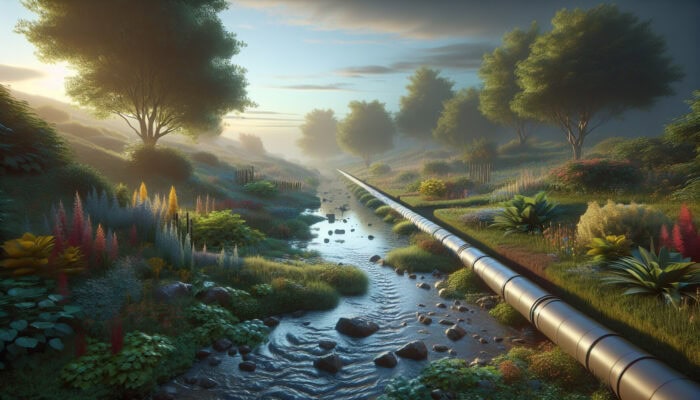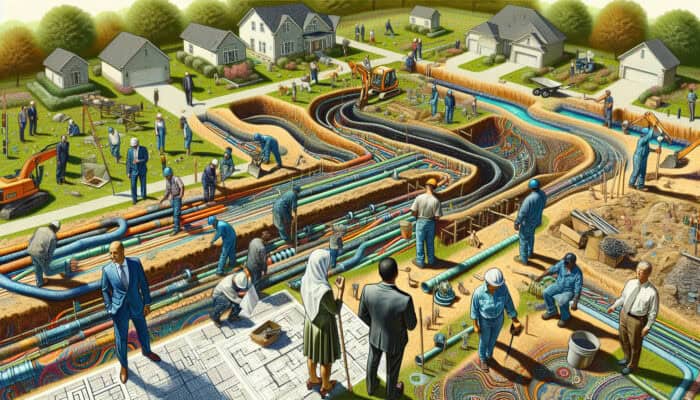Actionable Techniques for Effective Landscape Drainage Solutions to Protect Your Property
Understanding Landscape Drainage: The Essential Element for Property Protection

Within the field of landscape drainage, especially in the West End of Vancouver, proficient management of water resources is of utmost importance. This encompasses the intentional management of excess water to protect properties from adverse outcomes like flooding and erosion. Implementing various systems, including French drains, surface grading, and swales, is vital for redirecting water away from susceptible areas. The main aim is to maintain the health and functionality of landscaped zones while averting common drainage problems homeowners encounter, such as:
- water pooling in yards, rendering them unsightly and unusable.
- Basement flooding, which threatens both structural integrity and personal possessions.
- Soil erosion, which negatively impacts garden aesthetics and stability.
- Insufficient water diversion from foundations, which poses long-term risks of damage.
- Driveway washouts, leading to expensive repairs.
- Mould and mildew proliferation due to excess moisture, creating health hazards.
- Deterioration of plant and lawn health, adversely affecting your property’s overall beauty.
For homeowners, grasping the intricacies of landscape drainage is vital, particularly in areas like the West End of Vancouver, where heavy and frequent rainfall can present significant challenges.
Understanding the Importance of Proper Drainage for Your Property’s Longevity and Safety
The importance of effective drainage systems cannot be overstated. Primarily, these systems play a crucial role in preventing soil erosion, which not only jeopardises the visual beauty of landscapes but also threatens the structural soundness of buildings. If water flow is unmanaged, it can compromise foundations, leading to costly remediation efforts in the future. Furthermore, a well-designed drainage system ensures that plants receive the appropriate amount of hydration, averting over-saturation that may result in health complications for the vegetation. This equilibrium is critical for both residential and commercial properties, as it aids in preserving their aesthetic appeal and safeguarding their overall market value.
Moreover, an efficient drainage system minimises health risks associated with stagnant water, such as insect infestations and mould growth. By investing in top-quality drainage solutions, homeowners can cultivate a safer living environment while also enhancing the aesthetic and market value of their properties.
Exploring the Key Benefits of Professional Drainage System Installation
Opting to hire professionals for the installation of drainage systems presents numerous advantages. Qualified experts ensure that the drainage solutions are meticulously tailored to meet the specific conditions of each property. This includes critical factors such as soil type, topography, and existing infrastructure. Such a custom approach vastly improves the efficiency and longevity of drainage systems.
Additionally, having professionals conduct your drainage system installation can lead to significant long-term savings for homeowners. By proactively addressing potential drainage issues from the outset, the risk of incurring expensive repairs related to water damage is markedly diminished. Many professionals also offer warranties on their work, providing homeowners with peace of mind that their systems will operate effectively for many years to come.
Thorough Examination of Landscape Drainage Services Available in West End, Vancouver

Understanding the Unique Drainage Challenges in the West End
The West End of Vancouver is distinguished by its high-density urban environment and unique geographical characteristics, including its proximity to the coastline and surrounding hills. These features create particular challenges for landscape drainage systems. The region’s substantial rainfall levels necessitate drainage solutions capable of managing sudden and intense downpours, especially during the wet season.
Local professionals have successfully implemented various strategies, such as French drains and permeable paving, across a range of properties to tackle these drainage challenges. A notable example involves a residential project where French drains were installed to redirect water away from a basement that consistently faced flooding. This solution not only protected the home but also enhanced the overall landscape, resulting in healthier garden beds that thrived without the risk of waterlogging.
Determining the Most Suitable Drainage System for Your Property
Selecting the appropriate drainage system for your property is a critical decision influenced by various factors, such as soil type, topography, and existing water flow patterns. In the West End, where clay soils are common, it may be necessary to adopt systems that improve drainage, like French drains or dry wells.
For properties with significant slopes, techniques like surface grading can effectively redirect water away from the foundation. Homeowners should also consider any existing structures or landscaping features that could influence drainage dynamics. Consulting with a local drainage expert can provide tailored recommendations, ensuring the chosen system effectively addresses the specific drainage challenges prevalent in the area.
Step-by-Step Guide to Installing Drainage Systems

The process of installing landscape drainage systems involves several essential steps. Initially, a thorough site evaluation is conducted to assess current conditions and pinpoint problematic areas. Following this assessment, a drainage system is meticulously designed, considering the unique features of the property and the most effective solutions to tackle these challenges.
Once the design phase is complete, the implementation stage commences, which may require excavation for trenching, installation of drainage materials, and precise grading adjustments. Homeowners are encouraged to remain engaged throughout the process, asking questions and providing feedback to ensure that the final system meets their expectations. By understanding each stage of the installation, homeowners can effectively prepare their property for a smooth and successful process.
Identifying Common Drainage Issues in West End, Vancouver
Understanding the Causes of Poor Drainage Conditions
Poor drainage in the West End can stem from various factors, including heavy rainfall, soil compaction, and improper grading. In urban environments where impervious surfaces like asphalt and concrete prevail, water often struggles to flow naturally, resulting in pooling and flooding. Additionally, soil compaction frequently occurs due to foot traffic or heavy machinery, restricting the ground’s ability to absorb water effectively.
Improper grading can exacerbate drainage problems, causing water to flow towards, instead of away from, structures, increasing the likelihood of water-related complications. Identifying these causes is crucial for effectively resolving drainage issues and implementing suitable solutions tailored to the unique conditions of West End properties.
Monitoring Symptoms That Indicate Drainage Problems
Early detection of drainage issues can prevent extensive property damage. Common signs that suggest drainage problems include:
- Water pooling in various areas of the yard, creating unattractive and unusable spaces.
- Consistently soggy ground, indicating poor drainage.
- Basement or crawl space flooding, which can lead to significant damage.
- Cracks in foundation walls, indicating potential structural concerns.
- Mould or mildew growth inside or around the property, posing health risks.
- Unusual plant growth patterns, with some areas thriving while others decline.
- Water stains on walls or floors, indicating moisture intrusion.
Being vigilant about these indicators allows homeowners to address drainage concerns promptly, preventing them from escalating into more severe and costly repairs.
Tailored Solutions to Address Specific Drainage Challenges
Effectively resolving drainage issues requires customised solutions based on the specific problems encountered. For instance, if water pooling arises due to insufficient grading, simple adjustments to the landscape’s slope may suffice to rectify the issue. In more complex scenarios, such as ongoing basement flooding, a comprehensive drainage system may be necessary.
In cases where severely compacted soils are present, aeration techniques can significantly enhance water absorption. Moreover, the installation of catch basins or perforated pipes can improve water management in areas prone to excessive moisture. Customising solutions to meet the distinct challenges of each property ensures effective drainage and long-term functionality.
The Impact of Poor Drainage on Your Property’s Market Value
The ramifications of inadequate drainage extend beyond mere inconvenience; they can substantially affect property value. Properties with unresolved drainage issues often experience depreciation due to the risk of water damage, structural complications, and the potential for costly repairs. Homebuyers are increasingly discerning regarding the importance of reliable drainage systems and may hesitate to invest in properties that display signs of water-related challenges.
Conversely, proactively addressing drainage concerns can enhance property value by showcasing responsible maintenance and care. Well-managed drainage systems contribute not only to the structural integrity of homes but also improve their aesthetic appeal, making them more attractive to prospective buyers.
Critical Maintenance Practices for Your Drainage System
Key Maintenance Tasks to Include in Your Routine
Regular maintenance of your drainage system is essential for its longevity and optimal performance. Key maintenance tasks include:
- Cleaning gutters and downspouts to prevent clogs that can lead to overflow.
- Inspecting drainage systems for signs of wear, damage, or blockages.
- Ensuring that water flows correctly around the property, preventing pooling.
- Checking for sediment buildup in drainage areas, which can obstruct flow.
- Monitoring plant health, as overly moist areas may signal underlying drainage issues.
- Trimming vegetation surrounding drainage systems to prevent obstruction.
- Regularly evaluating the condition of drainage materials to ensure functionality.
By integrating these maintenance tasks into a consistent schedule, homeowners can avert significant drainage problems while extending the lifespan of their systems.
Recognising When to Seek Professional Help
Homeowners should consider reaching out to a professional drainage service when they notice persistent pooling of water, unusual odours, or signs of system failure, such as water backup. If uncertainties arise regarding the upkeep of the drainage system or if issues persist despite maintenance efforts, seeking professional assistance becomes crucial.
Expert services offer comprehensive evaluations and can propose effective solutions to restore proper drainage, preventing further complications. Recognising the right time to seek help can save both time and resources in the long run.
Financial Considerations for Maintaining Your Drainage System
The costs associated with maintaining a drainage system can vary significantly based on multiple factors, including the complexity of the system, frequency of service, and its location. Homeowners should plan for routine inspections, cleaning, and potential repairs as part of their financial management strategy.
Typically, routine maintenance can range from a few hundred dollars annually to higher expenses for complex systems requiring regular professional intervention. Understanding these costs enables homeowners to incorporate them into their overall property management budget, ensuring that drainage systems remain functional and efficient.
Proven Benefits of Landscape Drainage Services in West End, Vancouver
Enhancing Property Value Through Effective Drainage Systems
Implementing well-designed drainage systems can significantly elevate property value by preventing water damage and promoting landscape vitality. For example, properties featuring advanced drainage solutions, such as permeable pavers or green roofs, have demonstrated increases in market value due to their reduced risk of flooding and enhanced visual charm.
Moreover, homeowners in the West End have reported successful property sales after addressing drainage issues, as potential buyers appreciate well-maintained landscapes that indicate lower future maintenance costs. Investing in proper drainage not only safeguards the property but also serves as a compelling selling point in real estate listings.
The Environmental Advantages of Effective Drainage Solutions
Proper drainage systems offer considerable environmental benefits by minimising runoff and preventing soil erosion. When water is effectively managed, the risk of pollutants entering local waterways is lessened, contributing to a healthier ecosystem. Additionally, well-designed drainage solutions can enhance groundwater recharge by allowing water to infiltrate the soil instead of running off.
In urban settings like the West End, adopting sustainable drainage practices can mitigate flooding while strengthening the resilience of the natural landscape. By supporting local ecology through effective drainage, homeowners positively contribute to both environmental sustainability and community welfare.
Insights from Recent Research on Drainage Efficiency
Studies indicate that well-constructed drainage systems significantly reduce water-related issues, enhancing both property value and the usability of outdoor spaces. Research has shown that properties equipped with effective drainage solutions experience fewer instances of flooding and water damage, leading to lower long-term maintenance costs.
Experts continue to advocate for customised drainage strategies that take into account local climate and soil conditions, as these factors are pivotal for maximising efficiency. Analyzing recent studies underscores the importance of investing in high-quality drainage solutions, particularly in regions prone to heavy rainfall, such as the West End.
Improving Outdoor Living Spaces Through Proper Drainage
Effective drainage is crucial for enhancing outdoor living spaces. By preventing waterlogging, homeowners can create functional patios, gardens, and recreational areas that remain usable year-round. Well-drained landscapes provide an ideal foundation for outdoor furniture, barbecues, and social gatherings, ensuring these areas are inviting and enjoyable.
Furthermore, proper drainage fosters healthy plant growth, allowing landscaping efforts to flourish without the risk of over-saturation. Homeowners can maximise their enjoyment of outdoor spaces while simultaneously increasing property value through thoughtfully designed drainage solutions.
Long-Term Financial Benefits of Investing in Drainage Solutions
Investing in high-quality drainage solutions yields substantial long-term financial advantages. By implementing effective systems, homeowners can mitigate risks associated with water damage, which can result in significant financial setbacks. Proper drainage decreases the likelihood of costly repairs related to flooding, foundation issues, and mould remediation.
Moreover, maintaining a robust drainage system can enhance overall property value, leading to a better return on investment over time. For homeowners in the West End, this proactive approach to drainage not only safeguards their property but also represents a sound financial strategy.
Selecting the Right Landscape Drainage Service Provider
Essential Qualities to Look for in a Drainage Company
When selecting a drainage service provider, it is essential to consider several key traits. Look for companies that demonstrate:
- Proven experience and expertise in landscape drainage solutions.
- Relevant certifications and licenses, ensuring compliance with regulations.
- A strong reputation within the local community, reflecting customer satisfaction.
- Comprehensive service offerings to tackle various drainage challenges.
- Transparent pricing with detailed estimates, avoiding hidden costs.
- Positive customer testimonials and references attesting to their reliability.
- A commitment to sustainable practices and eco-friendly solutions, aligning with environmental goals.
These qualities indicate a reliable provider capable of delivering effective drainage solutions tailored to your property’s specific needs.
Evaluating a Company’s Track Record and Performance
Assessing a drainage company’s previous work is crucial for making informed decisions. Start by checking references and requesting testimonials from past clients. Additionally, reviewing before-and-after photos of completed projects can provide valuable insight into the quality and effectiveness of their work.
Understanding the scope of prior projects will help you gauge whether the company has experience with situations similar to yours. This thorough evaluation process ensures that homeowners select a provider with a proven track record of success in landscape drainage.
Key Questions to Ask Before Hiring a Drainage Service Provider
Before engaging a drainage service provider, asking the right questions is vital for clarifying expectations and ensuring a suitable match. Inquire about their experience with local drainage challenges, the specific methodologies they utilise, and any warranties they offer on their work.
Furthermore, request detailed cost estimates and timelines for project completion. Clear communication regarding strategies, materials used, and ongoing maintenance can foster a collaborative relationship, ensuring that your drainage needs are effectively met.
Innovations Shaping the Future of Landscape Drainage
Revolutionary Solutions Transforming Drainage Systems
The landscape drainage sector is rapidly advancing, with various innovations emerging to enhance efficiency and sustainability. Smart drainage systems equipped with sensors can monitor moisture levels and automatically adjust water flow, optimising performance and resource utilisation.
Additionally, eco-friendly materials and techniques, such as green roofs and rain gardens, are gaining popularity. These solutions not only manage water effectively but also benefit the environment, making them ideal choices for environmentally conscious homeowners. As these trends continue to evolve, they will shape the future of drainage solutions, especially in urban areas like the West End.
The Impact of Climate Change on Future Drainage Requirements
Climate change is expected to significantly influence drainage needs in the West End and beyond. Increased rainfall intensity may worsen existing drainage challenges, necessitating more robust and resilient systems to manage greater volumes of water.
Understanding these future challenges is crucial for both homeowners and drainage professionals. By anticipating these changes and investing in advanced solutions, property owners can better prepare for the evolving landscape of water management.
The Role of Technology in Modern Drainage Solutions
Technology is becoming increasingly integral to landscape drainage solutions, particularly in design, monitoring, and maintenance. Software enables system modelling, allowing individuals to predict potential issues and develop effective strategies.
Moreover, smart technologies facilitate real-time monitoring of drainage systems, alerting homeowners to potential failures or blockages before they escalate into costly problems. The integration of technology into drainage solutions enhances overall effectiveness and efficiency, greatly benefiting homeowners in the West End.
Urbanisation and Its Influence on Future Drainage Needs
As urbanisation continues to expand in the West End, the demand for innovative drainage solutions grows. The prevalence of impermeable surfaces, such as roads and buildings, can generate higher runoff volumes, intensifying the risk of flooding in urban settings.
To address these challenges, developers and homeowners must explore sustainable drainage practices that effectively manage increased water flow. Implementing strategies such as permeable paving and green infrastructure will be essential in maintaining a balanced urban ecosystem while preventing flooding.
Your Questions Answered: Frequently Asked Questions About Landscape Drainage
Identifying Common Signs of Drainage Issues
Common indicators include water pooling, soggy ground, basement flooding, and mould growth. Recognising these early signs can assist in preventing significant damage.
Recommended Maintenance Frequency for Your Drainage System
Regular maintenance is advised at least once a year, but more frequent checks may be necessary in areas experiencing heavy rainfall or following severe weather events.
The Average Cost of Installing a Drainage System
The cost of drainage installation can vary widely based on system complexity and property size, typically ranging from a few thousand to tens of thousands of dollars.
Is DIY Installation of Drainage Systems Possible?
While some homeowners may possess the skills to install basic systems, professional installation is recommended for complex drainage solutions to ensure proper design and functionality.
Preventing Drainage Issues from Arising
Regular maintenance, proper grading, and investing in effective drainage solutions can significantly help in preventing drainage issues from developing.
The Best Drainage Systems for Clay Soil
French drains and dry wells are often suitable for clay soils, as they assist in redirecting excess water away from problematic areas.
Do Drainage Systems Require Permits in Vancouver?
Yes, certain drainage installations may necessitate permits. It’s crucial to consult local authorities before commencing any drainage project.
Expected Lifespan of a Drainage System
With proper maintenance, most drainage systems can last over 10 years; however, some components may require replacement sooner due to wear and tear.
What to Do If Your Drainage System Becomes Clogged
If you suspect a clog, inspect the system for visible blockages and clear them if it is safe to do so. Otherwise, consult a professional for further assistance.
Availability of Eco-Friendly Drainage Solutions
Yes, numerous eco-friendly drainage solutions, such as rain gardens and permeable pavers, are designed to manage water sustainably while benefiting the environment.
Connect with us on Facebook!
Presented By: Landscape Drainage in West End Vancouver
The Article: Landscape Drainage Services in West End Vancouver: Your Solution First Published On: https://pacificbluemechanical.ca/
The Article Landscape Drainage Services: Your Solution in West End Vancouver Was Found On https://limitsofstrategy.com
Citations:
Landscape Drainage Services: Your Solution in West End Vancouver


